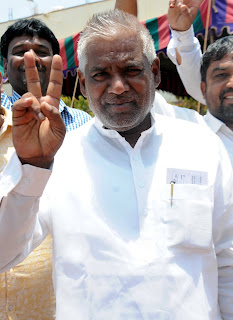A village named Google in Karnataka!
Search for Google ends in Karnataka
Rishikesh Bahadur Desai, TNN Nov 27, 2009, 03.49am IST
RAICHUR: You can't google in Google. For, Google, a tiny village about 510km north-east of Bangalore, doesn't have internet connectivity.
This village on the banks of the Krishna river in Raichur district, with just about 1,000 residents, is far removed from the search engine company based in Mountain View, California. And how you spell the name in English is left to you as all signboards here, including those of government offices, are in Kannada. When the government tried to put up English boards, activists stopped them. ''We asked officials if anyone from Cambridge University would come here to read these boards,'' laughs Kannada activist K P Yallayyanayaka.
No wonder then that only a few villagers have heard of their famous namesake in cyberspace. ''My grand-daughter told me that two boys have named a website after our village. I feel happy and proud,'' says landlord Basavarajappa Gouda Police Patil. ''Who'll not be happy to know the name of our village is so popular in the cyber world? But this is just a pleasant coincidence. Americans will have totally different reasons for naming their company Google,'' reasons native Sharana Gouda, an agricutural scientist who works in Bellary.
The story goes that 12th century saint poet Allama Prabhu stopped by in the village while travelling from Basava Kalyan to Shreeshailam in Andhra Pradesh. The cave he stayed in has been described as 'Gavi Gallu' (cave of stone), say villagers. ''Our village was hence called Gavi Gallu. Over the years, it became Googallu and now it's Google,'' says Gouda.
As proof, residents point to the temple atop the underground cave now. Devotees crawl through a hole in the ground to enter the cave, which has an idol of Allama Prabhu and a small well. Experts, however, point to a piece of history that they say is closer to the truth.
''The Helavas, who went around telling people about their ancestral history, say the village was named after rocks that seemed to sing,'' says writer Chidananda Sali.
The name comes from 'Kooguva Kallu' (stones that make a pleasant sound when river water strikes them), he says.
''The sound wasn't produced by river water but by people who wanted to communicate with villagers in far-off places,'' explains S K Aruni, assistant director of Indian Council of Historical Research.
''In ancient times, people would send signals to far-off villages by hitting rocks with small sonorous stones. This produced cup-like marks in the rocks. Prehistoric rocks with such cup marks are found in several places in the Krishna river basin, such as Watkal, Hunasagi, Hebbal Burj and other villages in Gulbarga and Raichur districts. So, it's possible that a village with such rocks was called Kooguva Kallu,'' he adds.
Ads by Google
Rishikesh Bahadur Desai, TNN Nov 27, 2009, 03.49am IST
RAICHUR: You can't google in Google. For, Google, a tiny village about 510km north-east of Bangalore, doesn't have internet connectivity.
This village on the banks of the Krishna river in Raichur district, with just about 1,000 residents, is far removed from the search engine company based in Mountain View, California. And how you spell the name in English is left to you as all signboards here, including those of government offices, are in Kannada. When the government tried to put up English boards, activists stopped them. ''We asked officials if anyone from Cambridge University would come here to read these boards,'' laughs Kannada activist K P Yallayyanayaka.
No wonder then that only a few villagers have heard of their famous namesake in cyberspace. ''My grand-daughter told me that two boys have named a website after our village. I feel happy and proud,'' says landlord Basavarajappa Gouda Police Patil. ''Who'll not be happy to know the name of our village is so popular in the cyber world? But this is just a pleasant coincidence. Americans will have totally different reasons for naming their company Google,'' reasons native Sharana Gouda, an agricutural scientist who works in Bellary.
The story goes that 12th century saint poet Allama Prabhu stopped by in the village while travelling from Basava Kalyan to Shreeshailam in Andhra Pradesh. The cave he stayed in has been described as 'Gavi Gallu' (cave of stone), say villagers. ''Our village was hence called Gavi Gallu. Over the years, it became Googallu and now it's Google,'' says Gouda.
As proof, residents point to the temple atop the underground cave now. Devotees crawl through a hole in the ground to enter the cave, which has an idol of Allama Prabhu and a small well. Experts, however, point to a piece of history that they say is closer to the truth.
''The Helavas, who went around telling people about their ancestral history, say the village was named after rocks that seemed to sing,'' says writer Chidananda Sali.
The name comes from 'Kooguva Kallu' (stones that make a pleasant sound when river water strikes them), he says.
''The sound wasn't produced by river water but by people who wanted to communicate with villagers in far-off places,'' explains S K Aruni, assistant director of Indian Council of Historical Research.
''In ancient times, people would send signals to far-off villages by hitting rocks with small sonorous stones. This produced cup-like marks in the rocks. Prehistoric rocks with such cup marks are found in several places in the Krishna river basin, such as Watkal, Hunasagi, Hebbal Burj and other villages in Gulbarga and Raichur districts. So, it's possible that a village with such rocks was called Kooguva Kallu,'' he adds.
Ads by Google

Comments